"I love Nature partly because she is not man, but a retreat from him. None of his institutions control or pervade her. There a different kind of right prevails. In her midst I can be glad with an entire gladness. If this world were all man, I could not stretch myself, I should lose all hope. He is constraining, she is freedom to me. He makes me wish for another world. She makes me content with this." - Henry David Thoreau, January 3, 1853
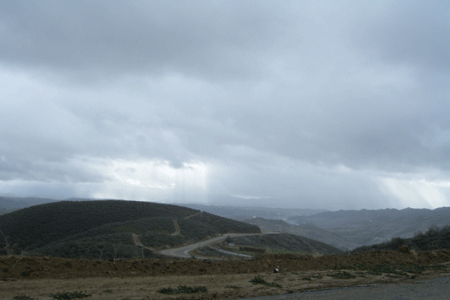
Abandoned but still there: "Ridge Route" straddles the tops of hills for miles above the Castaic anbd Tejon passes. Once a heavily travelled tourist route, the road now is desolate, muddy when it rains, with broken asphault and hairpin turns, but the wind is quiet up there, and the sights are beautiful. Photo taken in January, 2008. (Photo: K. Anderberg)
I like to be alone in nature.
Yet I am constantly told that is not safe. I am warned to take someone with me on every hike. Yet part of why I like going into nature is to get away from humans. I do not want to have to take a human chaperone with me every time I go into nature. That ruins it, to be blunt. I don't want to hear a human voice out there, I want to hear the stunning whisk of silence, I want to hear birds and frogs, not another human. Sometimes I will be watching a gorgeous sunset at the beach and all of a sudden two Chatty Cathys will walk by and for a few minutes I have to endure a he said-she said gossip narration until they trail out of sight again. It is a rude awakening from humans that interrupts my communing with nature often, thus getting away from humans, alone into the wild of nature, really is appealing to me. Yet, as I have said, I am constantly told this is not a safe behavior. My son bought me a cell phone partly because he did not like the idea that I would drive off into canyons and go into nature alone. Yet, cell phones don't work deep in those canyons, ironically, and perhaps, thankfully, so.
When I look back into American history and literature, I see a plethora of predominantly male writers speaking of the grandeur of leaving society and living in nature. John Muir, H.D. Thoreau, Everett Ruess, even recently the movie Sean Penn produced entitled, "Into the Wild," all have a theme of man alone in nature. Yet, as I said, I am constantly discouraged from going into nature alone. No one, as a matter of fact, has been okay with the idea of me just walking into some of these canyons alone like I do. But is it nature or man they are worried about, regarding safety? That actually is my question.
I was on the beach last week and a woman began talking to me about nature. I told her about a journey I had taken alone at night not long ago into the Santa Paula foothills, and she immediately said I should not be doing that. She said, "times have changed and it is no longer safe to do that. You need to go with others." I asked what had changed since say, the days of John Muir, out there in those foothills and canyons, that would make nature more dangerous to me now than in years past. I said for the amount of people who have wandered into nature, and the few who have been killed by wild animals, my odds were much lower of dying from a wild animal attack than say driving in a car on a Los Angeles freeway. I have as great a chance of getting eaten by a shark while swimming in the ocean, as I do being eaten by a mountain lion or bitten by a rattlesnake in canyons, and I do not hesitate to swim in the ocean where I live, why should I hesitate to go into canyons too? I asked the woman if she was saying I was in danger from animals or man. She repeated that "times have changed." I asked if that meant I should not go out in nature alone because of the danger of man attacking me, or animal. She did not want to say it, apparently, but in all reality, she was saying I should not go into nature alone predominantly because I am female.
Granted, nearly every account I have ever read of humans going alone into nature is written by a man. And I am a woman. Is nature off limits, just as many streets in cities are at night, to women, due to the danger of man behaving as stalking animal on women as prey? Do we have to "take back the wild," besides "taking back the streets?" At least in canyons, officials post warning signs about wild animals that may attack. Do we just assume that of man, so we need no warning signs? Honestly, I refuse to look at humanity in such disparaging terms. Yet there is still a real issue of safety.
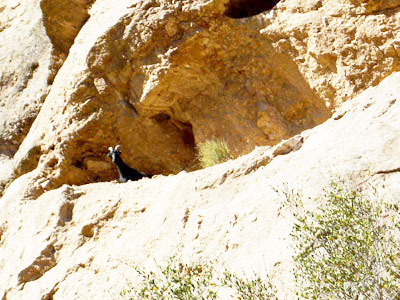
Mountain Goat in Bouquet Canyon, 2008. (Photo: K. Anderberg)
Last summer I went for a jaunt in Bouquet Canyon (north of Los Angeles, CA) alone one morning, before the sun heated everything up to about 100 degrees, by about 9 a.m. I was not the only one trying to enjoy the outdoors before the sun made everything inhospitable and shade was required. As I wandered up a small canyon between some very impressive sandstone blocks with caves eroded in them, I was concentrating on the caves above. I was intrigued by the character of the geology and also thinking about how those caves must harbor a lot of life out here in the desert landscape. Then, all of a sudden, a very large black mountain goat, with impressive horns, appeared on a ledge directly above me. At first, I had no fear, I was just enamored with its beauty. I took a few pictures of him. But then he began to act agitated, pacing and snorting, and I began to feel he was telling me to leave…now. I began to move a few feet back, and he jumped down to the next layer of rocks so fast I was stunned. He seemed to be saying, "get out of here, now." And I obeyed. I immediately walked back out of the canyon, as he was intimidating and was most definitely engaging with me. He stood on the rock ledge watching as I left the canyon. Honestly, I know nothing about mountain goats such as this one I encountered. I have no idea what the protocol is in that situation. I know if a mountain lion appears you are to never turn your back on it or it will attack the top of your spine. They say to "make yourself as big as you can, waving your arms and standing up straight," and never run, or they will view you as prey. But how counter-intuitive is that?! Yicks.
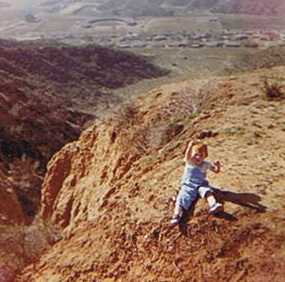
Kirsten, 1963, sitting on ledge above Guadilamar Drive in Saugus, CA, where there were lots of abandoned caves...(Photo: Archives of K. Anderberg)
I have spent a lot of my life in the outbacks of nature and never experienced anything so dangerous as to prevent me from wanting to go out in nature alone. I have seen my share of rattlesnakes on paths in front of me, they all just move on as long as you leave them alone. I grew up with tarantulas on our lawns and have had to remove scorpions from our shag rug. Again, I feel my chances of getting killed in a car accident on a freeway far surpass the chances of animals killing me in nature. My father used to take me up into the canyons and onto the bluffs of Saugus, hiking with just me and him when I was only 2 years old. We would explore caves, and see amazing views. I never once felt in any danger at all. He did not consider not going caving and hiking in the wild hills around him due to wilderness dangers. He took his baby with him, that is how little he feared that environment.
I swam in oceans as a child of age 5 and up, out past the wave line, without any fear. I also explored the deserts of Baja (Mexico) alone, even swimming in the Gulf of CA at night, alone, as a 13 year old. Though it could be said my parents were irresponsible and negligent, and I would not let my own son do such things alone and unsupervised, I did do a lot of things in the Mexico desert, without anyone else around me, and I am still alive today. In the morning, we could see sidewinder trails in the sand in front of our trailer in Baja. And when we went into the water, we had to shuffle our feet to warn stingrays we were coming so they would not sting us by us accidentally walking on them. But with all of the kids we had, and all of their friends, and my parents next to nonexistent parental supervision, no one died out there in the desert. And there was nothing out there in Baja but my family and nature. It was pitch dark, bats came out in droves at night, and when you swam in the ocean there, you could feel tons of fish and slimy things slithering by on your legs. I loved swimming in the ocean, alone, at night, surrounded by nothing but stars, the moon, the mountains to the west, the ocean and horizon to the east and the vast desert once at the shore. Even as a rebellious teen, I could slow down and appreciate the beauty therein. I also often took a rowboat out into the Gulf without anyone else, and I took the dune buggy out into the desert alone as well. Only once did the dune buggy break out in the middle of nowhere, and luckily I was with my sister. We got worried in the blazing sun. But her high school auto mechanics class paid off and we lived to see another day. This idea that nature will kill you if you go out in it, has not proven to be true in my own life experience.
Granted, I do not push past my own physical skill levels and know when to pull back with a healthy respect for nature itself. I have seen the twisted rocks inside the hills in this region, and I have studied the frightening contorts of lava rocks thrown up on the beach, revealing the nearly unimaginable energy beneath the earth's crust and waves. Yet I am still trying to assess what is dangerous and what is not. And whether or not I can, or should, go into nature alone, as so many great thinkers and writers before me have done. I agree with Thoreau that some places in nature perhaps are meant to not be invaded by man. And that some places in nature seem to scream, as the mountain goat did to me, "get out of here." Thoreau wrote in his essay "Ktaadn," published posthumously, "The tops of mountains are among the unfinished parts of the globe, whither it is a slight insult to the gods to climb and pry into their secrets, and try their effect on our humanity. Only daring and insolent men, perchance, go there." Thoreau describes an adventure into nature where he is in awe and wonders if man should not go into certain places in nature. "He is more lone than you can imagine…Nature has got him at a disadvantage, caught him alone, and pilfers him of some of his divine faculty. She does not smile on him as in the plains. She seems to say sternly, Why came ye here before your time. This ground is not prepared for you. Is it not enough that I smile in the valleys? I have never made this soil for thy feet, this air for thy breathing, these rocks for thy neighbors. I cannot pity nor fondle thee here, but forever relentlessly drive thee hence to where I am kind. Why seek me here where I have not called thee, and then complain because you find me but a stepmother? Shouldst thou freeze or starve, or shudder thy life away, here is no shrine, nor altar, nor any access to my ear." Thoreau goes on to write, "It is difficult to conceive of a region uninhabited by man. We habitually presume his presence and influence everywhere."
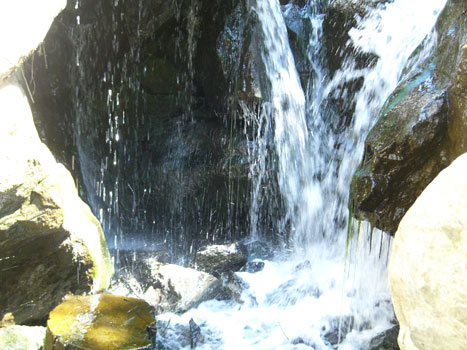
Bouquet Canyon Waterfall, 2008. (Photo: K. Anderberg)
Last summer, I went up to the Bouquet Canyon waterfall. It was over 100 degrees outside, yet this stream of water was roaring under the canopy of oaks, and over rocks, with a backdrop of sandstone caves and boulders akin to the scenery in all of the Western movies Hollywood is famous for. I walked around the poison oak, and across the stream to the caves on the other side. It was beautiful. The colors and textures, even the contrast between blazing hot sun and rocks, and the cool breeze created by the water, was unique and intriguing. I stood under the waterfall and let it cool me. I was fully enjoying the scenery, the water, the hills and rocks and sun, and then, a man drove up in a truck. He spent too long in the cab of his truck at the road beside the waterfall for my comfort. I felt threatened and in danger alone up in the hills like that. I began to move towards my car immediately. The man acted very suspicious as I got into my car quickly. I drove up into the canyon further to get away from him, leaving him to the waterfall. I had pulled over to look at some rocks up the road a bit, and sure enough, this man came seemingly looking for me in his truck up the canyon in a few minutes. At that point, I felt stalked by a human, not a "wild animal," and felt I needed to leave the canyon for my own safety.
Earlier this winter there was a very thick fog on the beach in front of my house. I went out to walk in it. You literally could only see a few feet in front of you. As I stood at the ocean's edge, I was socked in completely by fog and had no idea what was happening even 20 feet on the beach away from me! It was a little frightening, to be honest. If a gigantic wave was headed towards me, I would not see it either. Every now and then a human or dog would break through the fog bubble and startle me! It felt a lot like the isolation of some of the canyons I visit, yet it was right in the city! But honestly, what I feared the most that day on the fogged in beach was not the waves or nature, but some guy trying to rape me under the cover of fog. It seems to me that the one animal I end up fearing and rearranging my actions for the most is human males. I feel I am stalked as the prey of male humans *much more* than by any other animal that endangers my safety and life. Thus it is ironic that I want to go into nature to escape that, yet am told that even in the wild, it is man that is the greatest risk and thus, I must have a chaperone or escort into the wild, as a woman.
Another off uniquity to human males in nature is no other animal in nature wants to rape me. A mountain lion, a bear, or snake could kill me, but they won't rape me. Rape is a very human activity with regards to my safety. I do not have to fear rape in the solitude of nature, which is a breath of fresh air in itself. Yet if a stranger, a male human, has penetrated that natural setting, the fear of rape comes with him onto the scene. If a woman comes to hear men she cannot see, hidden in the grasses and behind rocks, waiting to attack her while in nature, the freedom of the natural experience is nearly wholly compromised. Honestly, I think I would prefer a wild animal attack and kill me to a male human raping and killing me. The former seems more natural, less psychotic, and more civilized emotionally.
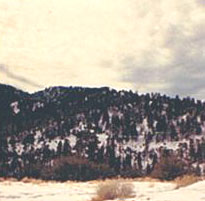
Angeles National Forest view from the front of Big Pines Ski Club, 1960's. (Photo: K. Anderberg)
Even more memories of nature not scaring me come to mind. As a child aged 6 on up, I used to explore the Angeles National Forest behind the Big Pines Ski Lodge, alone, for hours, without fear. I went quite a ways on a dirt road and discovered an abandoned zoo, and the woodpeckers were really loud out there, and lizards and chipmunks were scurrying all over. I could see bear tracks and the region is well known for cougars. We would hear coyotes at night from inside the lodge and bears routinely got into the garbage when we were there. I also liked to walk up the creek bed, into the canyon, alone, and would spend hours walking through the stream and walking up the canyons, again, never thinking at all about wildlife killing or attacking me. Yet now as an adult, I am told to be scared. I am much less vulnerable now, than as a 6 year old child alone in nature! It should be more safe for me to go out alone in nature now as an adult. Yet, as the woman said, "the times have changed." Is that true? I cannot tell exactly how to weigh her statements against reality.
Everett Ruess was an adventurer who seemed to idolize John Muir, trying to recreate the sense of adventure alone in nature that John Muir wrote of. Everett went into nature alone, leaving his family in CA, to explore the U.S. southwestern deserts and canyons in the 1930's. He disappeared and died at a young age in those desert lands as well. He left behind remarkable writings and some beautiful block prints as well, documenting his adventures. Everett was an artist at heart, yet also an adventurer who loved nature. In November, 1934, Everett wrote in a letter to a family member, "…you may remember that Christ once rode a donkey. So I'm not the only one. As to when I shall visit civilization, it shall not be soon, I think. I have not tired of the wilderness; rather I enjoy its beauty and the vagrant life I lead, more keenly all the time. I prefer the saddle to the streetcar and star-sprinkled sky to roof, the obscure and difficult trail, leading into the unknown, to any paved highway, and the deep peace of the wild to the discontent bred in cities. Do you blame me for staying here, where I feel that I belong and am one with the world around me? It is true that I miss intelligent companionship, but there are so few with whom I can share the things that mean so much to me that I have learned to contain myself. It is enough that I am surrounded with beauty and carry it with me in things that are a constant delight, like my gorgeous Navajo saddle blankets, and the silver bracelet on my wrist, whose three turquoises gleam in the firelight." Eighty years after Thoreau's writings on a nearly identical topic, we can see Everett Ruess coming to some of the same conclusions regarding nature and cities that Thoreau came to. And nearly eighty years after Everett's writings on the topic, I, too, find myself revisiting thoughts they shared in comradery.
And as Everett wrote that he is not the only one who has ridden a donkey, I am not the only thinker who has wanted to go into nature, alone. Sometimes to get away from people, sometimes just to get to nature. As Thoreau wrote in 1853, at times, human civilization "makes me wish for another world," while nature "makes me content with this." And as Everett wrote in 1934, I, too, prefer the "obscure and difficult trail, leading into the unknown, to any paved highway, and the deep peace of the wild to the discontent bred in cities." Weighing the risks facing me in this lifetime, again, I am more in danger of a car killing me on a L.A. freeway than a mountain lion eating me in a back canyon. I am driven to commune with nature, alone, as a woman. Is that more dangerous than me wandering a mile upstream through a canyon at age 6, alone, in Big Pines? Or me swimming in the ocean at night in Baja at age 13? How dangerous is it for me, as a woman in her 40's now, adventuring up the San Andreas faultline, through whistling mountain ridges and into lazy hot canyons at dusk? Or is it man that is the major threat to me in nature, finding me alone and hunting me like prey? Why are there so few women writers, in comparison to males, leaving essays about their sacred times in nature? I am writing this essay to add to the written record that other adventurous women have left us, though they are few in number compared to male adventurers, to say that I do think about such things as a woman in the 21st century, just as men thought about such things 150 years prior. Women do go out in nature without fear alone, for the same reasons as men. And we don't want a chaperone all the time. Yet the dangers of being alone in nature, of getting injured without help, or of animal attack, etc. are real. I respect the rangers who warn us, as Thoreau did, that nature is wild, and we may not be as welcome as we would like to fancy ourselves. Or, perhaps we had better check our "divine faculty" at the door when we enter those canyons and oceans alone. I find nature humbling in this capacity.
The benefits of nature coexist throughout civilization's presence. The benefits of "vision quests" alone in nature are well appreciated. Still, perhaps some places are not meant for humans, as Thoreau so eloquently says. Yet some humans prefer nature to cities. And some of us like both. I have been reading nature wilderness anthologies lately for a class. In one of the anthologies, "The Wilderness Reader," edited by Frank Bergon, and published in 1980, there are 23 male writers featured and only three women. It is thus worth noting the women mentioned: Isabella Bird, Mary Austin, and Rachel Carson. Of the three, I preferred Rachel's work to the others. Rachel writes about sea life in her 1955 book, "The Edge of the Sea," and echoes the profundity experienced by the male nature writers: "Contemplating the teeming life of the shore, we have an uneasy sense of the communication of some universal truth that lies just beyond our grasp. What is the message signaled by the hordes of diatoms, flashing their microscopic lights in the night sea? What truth is expressed by the legions of the barnacles, whitening the rocks with their habitations, each small creature finding the necessities of its existence in the sweep of the surf? And what is the meaning of so tiny a being as the transparent wisp of protoplasm that is the sea lace, existing for some reason inscrutable to us - a reason that demands its presence by the trillion amid the rocks and weeds of the shore? The meaning haunts and ever eludes us, and in its very pursuit we approach the ultimate mystery of Life itself."
The other nature writing anthology I am reading, "Of Discovery and Destiny," edited by Robert C. Baron and Elizabeth D. Junkin, and published in 1986, contains essays by over 50 men and 16 women, more than the other anthology, at least. The male authors in this anthology include famous male names we immediately recognize, such as Robert Frost, Mark Twain, Carl Sandburg, Edward Abbey, Zane Grey, John Wesley Powell, Jack London, Theodore Roosevelt, John Steinbeck, Ralph Waldo Emerson, Thomas Jefferson, Walt Whitman, Henry Wadsworth Longfellow, H.D. Thoreau, and more. The women authors in this anthology include a few famous names, such as Willa Cather and Emily Dickinson, but the women authors include names I do not recognize predominantly such as Nancy Wood, Sara Brooks, Sheila Burnford, Mari Sandoz, Mary Back, Ann Zwinger, Sally Carrighar, Annie Dillard, Rosalind Richards, and more. I would like to throw my hat into the ring of women nature writers. I appreciate nature in profound ways that do mimic the very mysteries of Life itself, as Rachel Carson writes. I see the stars as a mystery, I see the ocean as unfathomably deep, I see the rocks as a book of intelligent lessons I need to read to learn. I respect that nature wants its privacy from humans too. I understand that male humans may be the most dangerous thing in the wild regarding women humans' safety, just as in the cities, and am willing to write about that thorny subject, placing "politics" alongside "nature" in a realism oft avoided by others.
I am told not to venture into nature alone. I am told to take a chaperone. I am looking back, doing research, to see what women have written on this topic of going into the wilderness to venture alone like men such as Thoreau, Muir, and Ruess have written. And even if I cannot find those writings, I will write my own for other women to read in present tense. In the 21st century. And I encourage other women naturalist writers to help fill that gap, as well. And it is ironic, but I find I appreciate humans and society more, after being in nature. Thus I survive better in civilization, when I take breaks from it, which is the essence of the health spa retreat and our national parks system. Leaving society for a break. I think it is healthy, and necessary to go into nature, alone, without a chaperone, for sanity, on a regular basis and gender should not be a factor.
Thank you to Resist.ca for hosting this website!